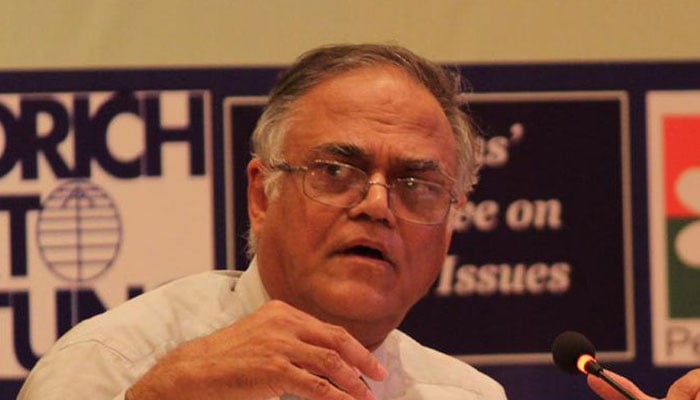Drawing parallels between theatre and politics
Theatre and politics have always had a curious relationship throughout history, with theatre displaying political themes since the time of ancient Greek theatre and politicians using various theatrical tools such as speech, costume and rhetoric to achieve their goals.
This was stated by Javed Jabbar, author and former senator and federal minister, as he delivered a lecture on the intertwining of performing arts and politics in Pakistan at the National Academy of Performing Arts on Thursday evening.
The talk was titled ‘Performing Arts and Political Crafts: A Symbiosis: Pakistan’s Origins, Present, and Future?’
A large part of the talk pertained to the history of Pakistan and how it gained independence. Jabbar said that although future was generally considered uncertain, the past is likewise. “History is the greatest mystery,” he said and explained that the more one read alternative views on history, the more realisation one got regarding how complex and multi-dimensional the past was and no simple explanation was enough for understanding the past events.
Drawing parallels between theatre and politics, the speaker said conflict and its resolution was a vital part of both. He said that as theatre heroes need to look good and master elocution, the same is a requirement for a political leader.
He said the dressing and appearance played a major role in the 1960 United States presidential election in which inexperienced John F Kennedy, who was not as insightful as his rival Richard Nixon, managed to win with the narrowest margin in the history of the US.
Coming to Pakistan, he termed 1937 one of the milestone years in the Independence struggle just for the reason that it was that year the Quaid-e-Azam by and large stopped wearing Savile Row suits and donned sherwani and Jinnah cap, a move that quickly connected him with the Muslims of South Asia who started believing that he belonged to them.
Similarly, he discussed how Zulfikar Ali Bhutto promoted Shalwar Kameez to maintain his image of people’s leader and Ziaul Haq continued switching between military uniform and sherwani that symbolised his military strength and Islamist agenda.
He also discussed Bhutto’s mastery over rhetoric and slogans to show how Bhutto’s political craft drew heavily from theatrical arts.
Later, Jabbar said Benazir Bhutto wisely ensured that she always had a dupatta on her head in her public appearances as that resulted in public respect for her.
The speaker said religion was a part of the Pakistani culture and it was supposed to shape the lives of Pakistanis, but the way religious parties tried to use religion as a tool of control created a lot of mess.
He was of the view that the Jamaat-e-Islami and Jamiat-e-Ulema-e-Hind had opposed the creation of Pakistan, due to which they or their subsidiary parties must not be those deciding the ideology of the country. He expressed satisfaction at the fact that never once in the history of the country, religious parties were voted into power by the people. He quipped that throughout its history, Pakistan acted like an improvised play.
Discussing the present and future of the performing arts in the country, the speaker lamented the decline in the general aesthetic taste of the public that was fueled by the social media. Describing the current situation as ‘chaotic incoherence’, he said attentional span of the people had shrunk and they generally did not have the understanding and knowledge that was required to extract pleasure from the performing arts, especially our enriched arts like the classical music.
However, he ended the talk on an optimistic note saying that craving for performing arts is ingrained in the human psyche and hence music, theatre and dance will continue in the country.
-
 Why Prince William Releases Statement On Epstein Scandal Amid Most 'challenging' Diplomatic Trip?
Why Prince William Releases Statement On Epstein Scandal Amid Most 'challenging' Diplomatic Trip? -
 Historic Mental Health Facility Closes Its Doors
Historic Mental Health Facility Closes Its Doors -
 Top 5 Easy Hair Fall Remedies For The Winter
Top 5 Easy Hair Fall Remedies For The Winter -
 Japan Elections: Stock Surges Record High As PM Sanae Takaichi Secures Historic Victory
Japan Elections: Stock Surges Record High As PM Sanae Takaichi Secures Historic Victory -
 Prince William, Kate Middleton Finally Address Epstein Scandal For First Time: 'Deeply Concerned'
Prince William, Kate Middleton Finally Address Epstein Scandal For First Time: 'Deeply Concerned' -
 Kim Kardashian Promised THIS To Lewis Hamilton At The 2026 Super Bowl?
Kim Kardashian Promised THIS To Lewis Hamilton At The 2026 Super Bowl? -
 Andrew Mountbatten-Windsor Throws King Charles A Diplomatic Crisis
Andrew Mountbatten-Windsor Throws King Charles A Diplomatic Crisis -
 Barack Obama Hails Seahawks Super Bowl Win, Calls Defense ‘special’
Barack Obama Hails Seahawks Super Bowl Win, Calls Defense ‘special’ -
 Pregnant Women With Depression Likely To Have Kids With Autism
Pregnant Women With Depression Likely To Have Kids With Autism -
 $44B Sent By Mistake: South Korea Demands Tougher Crypto Regulations
$44B Sent By Mistake: South Korea Demands Tougher Crypto Regulations -
 Lady Gaga Makes Surprising Cameo During Bad Bunny's Super Bowl Performance
Lady Gaga Makes Surprising Cameo During Bad Bunny's Super Bowl Performance -
 Paul Brothers Clash Over Bad Bunny's Super Bowl Performance
Paul Brothers Clash Over Bad Bunny's Super Bowl Performance -
 South Korea: Two Killed As Military Helicopter Crashes During Training
South Korea: Two Killed As Military Helicopter Crashes During Training -
 Elon Musk Unveils SpaceX’s Moon-first Strategy With ‘self Growing Lunar City’
Elon Musk Unveils SpaceX’s Moon-first Strategy With ‘self Growing Lunar City’ -
 Donald Trump Slams Bad Bunny's Super Bowl Performance: 'Absolutely Terrible'
Donald Trump Slams Bad Bunny's Super Bowl Performance: 'Absolutely Terrible' -
 Jake Paul Criticizes Bad Bunny's Super Bowl LX Halftime Show: 'Fake American'
Jake Paul Criticizes Bad Bunny's Super Bowl LX Halftime Show: 'Fake American'




